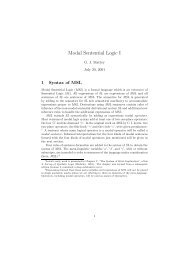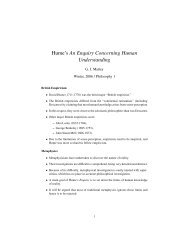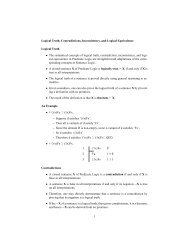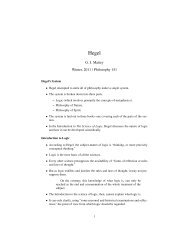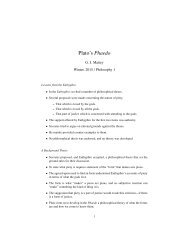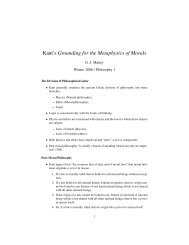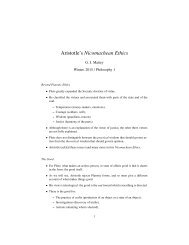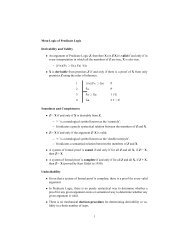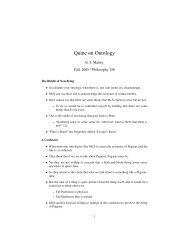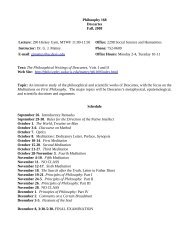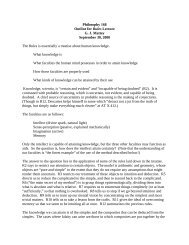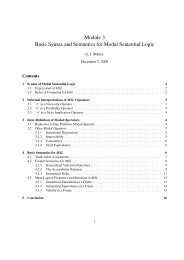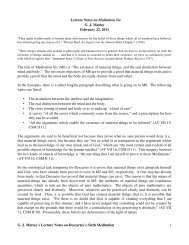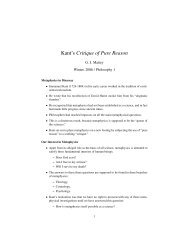Validity in Predicate Logic - the UC Davis Philosophy Department
Validity in Predicate Logic - the UC Davis Philosophy Department
Validity in Predicate Logic - the UC Davis Philosophy Department
Create successful ePaper yourself
Turn your PDF publications into a flip-book with our unique Google optimized e-Paper software.
An Example• D = {1, 2}, v(F) = {〈1〉}, v(G) = {〈2〉}• No variable assignment to ‘x’ satisfies both ‘Fx’ and ‘Gx’, and so none satisfies‘Fx & Gx’, so ‘(∃x)(Fx & Gx)’ is false.• d[1/x] satisfies ‘Fx’, so any d satisfies ‘(∃x)Fx• d[2/x] satisfies ‘Gx’, so any d satisfies ‘(∃x)Gx’; so, both premises are true.• So on this <strong>in</strong>terpretation, <strong>the</strong> premises are true and <strong>the</strong> conclusion false, whichdemonstrates <strong>the</strong> <strong>in</strong>validity of <strong>the</strong> argument.Determ<strong>in</strong><strong>in</strong>g <strong>Validity</strong>• Because validity of arguments is def<strong>in</strong>ed <strong>in</strong> terms of all possible <strong>in</strong>terpretations,it cannot be proved on <strong>the</strong> basis of a s<strong>in</strong>gle <strong>in</strong>terpretation.• General reason<strong>in</strong>g about <strong>in</strong>terpretations is required.• For this reason, we use metavariables to <strong>in</strong>dicate arbitrary:– Interpretations I– Doma<strong>in</strong>s D– Objects <strong>in</strong> <strong>the</strong> doma<strong>in</strong> u (with or without positive <strong>in</strong>teger subscripts)– Valuation functions v• At this level of generality, we can still draw conclusions about what must hold if<strong>the</strong> premises of an argument are to be true <strong>in</strong> an arbitrary <strong>in</strong>terpretation.An Example• To prove: {(∀x)(Fx ⊃ Gx), Fa} Ga• Let I be an arbitrary <strong>in</strong>terpretation, v a valuation function <strong>in</strong> I, and d an arbitraryvariable assignment.• Suppose that ‘(∀x)(Fx ⊃ Gx)’ and ‘Fa’ are true <strong>in</strong> I.• Let v(a) = u 1• Then for all u <strong>in</strong> <strong>the</strong> doma<strong>in</strong> D of I, d[u/x] satisfies ‘Fx ⊃ Gx’.• Because d satisfies ‘Fa’, 〈v(a)〉 ∈ v(F), so 〈u 1 〉 ∈ v(F).• Then d[u 1 /x] satisfies ‘Fx’, so d[u 1 /x] satisfies ‘Gx.’• It follows that 〈u 1 〉 ∈ v(G), so 〈v(a)〉 ∈ v(G).• Then d satisfies ‘Ga’, which is thus true <strong>in</strong> I, QED.2



